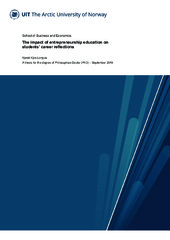Sammendrag
The thesis aims to explore the impact entrepreneurship education (EE) has on students’ career reflections. EE has developed significantly in both scope and importance over recent decades and is now being taught worldwide at all education levels. Major stakeholders, such as educators, education institutions, funders, governments and policymakers, are investing heavily in terms of human and/or financial resources to create, implement and develop EE initiatives. With such exponential development, there is a need for more knowledge on the implications of EE. However, despite the substantial growth in EE impact studies over recent years, the empirical findings remain mixed, conflicting and inconclusive.
Moreover, when career outcomes are addressed in impact studies, the focus is on entrepreneurship as a career, while EE’s broader career implications remain unexplored. Accordingly, the point of departure for the thesis is that present understanding of the impact of EE on career outcomes needs to be more comprehensive. There is a need to go beyond the narrow focus of ‘producing’ entrepreneurs and to take a broader perspective on the implications EE has for students’ careers. EE can be a space for career exploration that leads to career reflection, in which students discover more about themselves, about entrepreneurship, and about their career preferences. This is the background for focusing on students’ career reflections in the thesis and which led to the following overarching research question: How does participation in entrepreneurship education impact students’ career reflections? To address this, the thesis draws upon the literature on career development and investigates the potential of EE as a career exploration intervention that triggers students’ career reflection. The research question is examined through four sub-research questions, resulting in four papers.
The empirical findings suggest that EE can in fact function as a career exploration intervention that triggers students’ career reflection. Furthermore, in line with career development theory, the findings indicate that career exploration and reflection lead to either continued career commitment, or to career reconsideration of entrepreneurship as a career choice. Overall, the thesis offers new insight into the complexity of EE career impact and demonstrates the relevance of the career development literature to EE research and its potential as a rewarding direction for further research. Besides theoretical development, the thesis also provides a number of important implications for students, entrepreneurship educators and policymakers.
Har del(er)
Paper I: Longva, K.K. & Foss, L. (2018). Measuring impact through experimental design in entrepreneurship education: A literature review and research agenda. Industry & Higher Education, 32(6), 358-374. Also available at https://doi.org/10.1177/0950422218804912. Accepted manuscript version available in Munin at https://hdl.handle.net/10037/14457.
Paper II: Longva, K.K. (2018). Kapittel 14: Hope for the future? Students’ attitudes towards entrepreneurship, innovation, and international mobility. In H. Hogset, D.M. Berge & K.Y. Dale (Red.), Det regionale i det internasjonale – Fjordantologien 2018 (pp 243-266). Scandinavian University Press. Also available at https://hdl.handle.net/10037/16565
Paper III: Longva, K.K., Strand, Ø. & Pasquine, M. Entrepreneurship education as an arena for career reflection: the shift of students' career preferences after a business planning course. (Submitted manuscript).
Paper IV: Lynch, M., Kamovich, U., Longva, K.K. & Steinert, M. (2019). Combining technology and entrepreneurial education through design thinking: Students’ reflections on the learning process. Technological Forecasting & Social Change (in press). Also available at https://hdl.handle.net/10037/16520.


 English
English norsk
norsk
